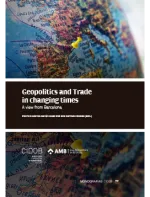Geopolitics and foreign trade: An economic–territorial view of the metropolis of Barcelona. A fundamental mutation

Geopolitics and foreign trade. The thesis: the strategic role of Barcelona’s economy in the Spanish and southern European economies We begin with the fact that the metropolis of Barcelona is formed of a central nucleus, the municipality of Barcelona; a network of industrial cities; proximal (Metropolitan Area of Barcelona, AMB) and orbital services (Metropolitan Region of Barcelona, RMB); with deep historical roots; and a network of European cities defined by the Barcelona–Lyon mega-region, which takes in the cities of the Mediterranean arc.
We will argue that:
The economy needs geopolitics to weave networks of synergy and complementarity between the cities in the mega-region. The aim is to achieve productivity growth based on the interaction between city networks, many of which are endowed with localisation economies linked to industrial activities. The fundamental mutation is to the nature of Barcelona’s external trade. The city has gone from being the capital of protectionism, the reserve of the Spanish internal market, to become a metropolis that is both open to foreign competition and competitive in its own right, and fundamentally geared towards European Union markets.
Unlike the metropolis of Madrid, whose profound trade deficit requires it to attract foreign savings (black hole effect), the metropolis of Barcelona shows the capacity to generate current account surpluses (star effect). This makes it central to achieving external balance in the Spanish economy.